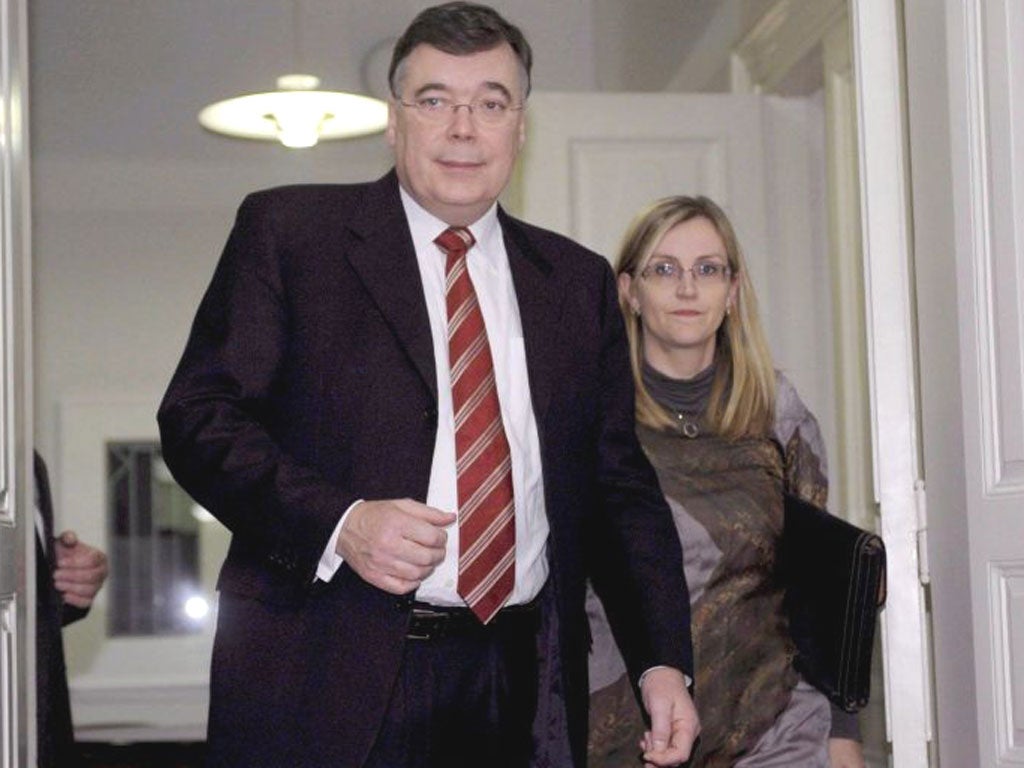Iceland's ex-PM refuses to take blame for financial meltdown as trial begins

For many, Geir Haarde is the villain responsible for the disastrous 2008 financial implosion from which Iceland is still recovering. But yesterday at his trial, the island's currently disgraced former-Prime Minister flatly rejected all such charges against him and defiantly insisted they were baseless.
Mr Haarde, 60, who is the first politician to be charged in connection with the global financial crisis, appeared at the opening of his trial at a special court in Reykjavik where he faces charges of negligence for failing to prevent the 2008 collapse of Iceland's main bank, which sparked the crisis.
The former head of the island's right- of-centre Independence Party, was prime minister from 2006 until early 2009 when his coalition was ousted from power amid rocketing inflation, spiralling unemployment and uproar over its alleged failure to properly oversee the country's financial institutions
But Mr Haarde told the court: "I applaud the fact that I am able to respond to the questions raised in this case, but I reject all the accusations and believe there is no basis for them." He added: "It is only with hindsight that it has become evident that not everything was as it should have been."
The collapse of Iceland's main bank pushed the country into a deep recession, spelt near disaster for holders of Icesave accounts in Britain and the Netherlands, before their money was guaranteed by their governments, and prompted a $2.1bn bailout from the International Monetary Fund. But the economy has since rebounded and is set to grow by 3.1 per cent this year.
Mr Haarde's statements to the court were a toned down version of interviews he gave before his trial in which he claimed he was the victim of "political persecution" and being made a scapegoat. Insisting that the interests of Icelanders were his "guiding light" he has blamed the crisis on the banks. He has pleaded not guilty and described the proceedings as preposterous.
However, despite claims that Iceland's meltdown was inextricably linked to the global crisis, a 2010 report commissioned by parliament – now controlled by the country's left-of-centre opposition – concluded much of the blame should be attributed to Mr Haarde and his government. It argued that both "lacked the power and courage to set reasonable limits on the financial system".
Under Iceland's legal system, members of parliament rather than an independent judiciary, were allowed to determine whether Mr Haarde and other members of his cabinet should face prosecution. Parliament decided by 33 to 30 votes to press charges against the former leader but declined to prosecute three other government members.
Mr Haarde is being tried by a special 15-member court. It contains five judges, a court president, a law professor and eight people chosen by parliament.
Legal experts have said Mr Haarde has a strong chance of being cleared, not least because of the court's political structure and growing public sympathy for a politician appearing to shoulder the burden of the crisis alone. If convicted he could face up to two years in prison.
Haarde times: the crisis unfolds
May 2007 Geir Haarde remains PM after a general election.
April 2008 As pressures build, the Government warns it may intervene in markets to fight hedge funds it says are attacking the financial system.
October 2008 Government takes control of the banks in an attempt to stabilise the financial system.
November 2008 IMF approves $2.1bn (£1.4bn) loan to Iceland.
January 2009 Haarde quits after protests, citing medical reasons.
April 2009 Prime Minister Johanna Sigurdardottir's centre-left coalition wins power.
February 2010 Unemployment rises to more than 15,000 (9 per cent of workforce) – up from just over 1,500 at the start of 2008.
Jenny Stevens
Subscribe to Independent Premium to bookmark this article
Want to bookmark your favourite articles and stories to read or reference later? Start your Independent Premium subscription today.

Join our commenting forum
Join thought-provoking conversations, follow other Independent readers and see their replies